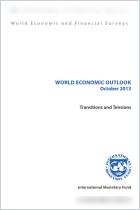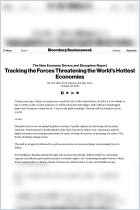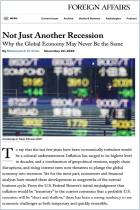Join getAbstract to access the summary!

Join getAbstract to access the summary!
Global Future Council on Financial and Monetary Systems
The Global Financial and Monetary System in 2030
World Economic Forum, 2018
What's inside?
Expect massive transformations to the global economic architecture by 2030.
Recommendation
The current growth trajectory of the global economy is promising. However, beyond 2020, uncertainties prevail. Writing for the World Economic Forum, a host of distinguished professionals explores “two seemingly opposed forces: decentralization and integration” and their potential impacts on the global economic order by 2030. getAbstract recommends this thought-provoking look at a possible financial future to executives, investors and analysts.
Summary
About the Author
The Global Future Council on Financial and Monetary Systems is a committee of the World Economic Forum.





















Comment on this summary